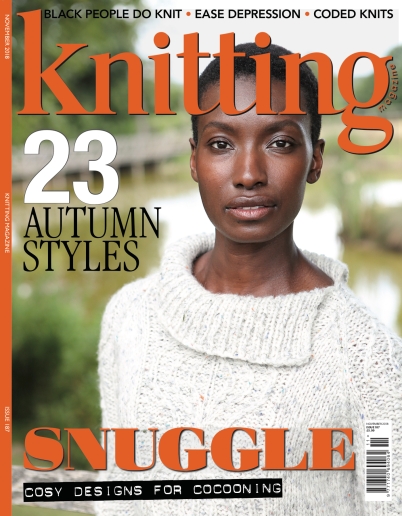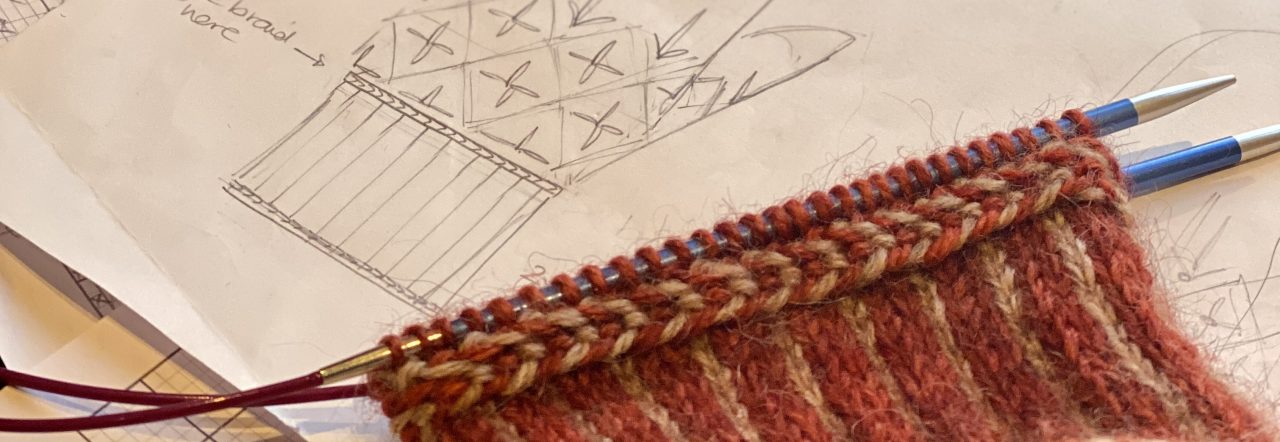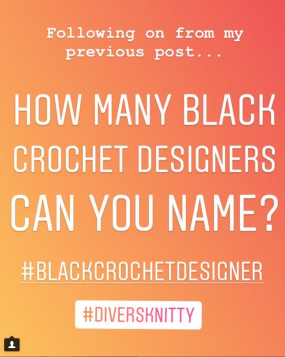
In this month’s issue of Knitting Magazine I’ve written an article entitled Black People Do Knit’. You can read the full article in the magazine following the links at the foot of this post so I won’t go into detail here but given the limited space available in print I felt I needed to add to it with a blog post…which may be long so prepare yourself.
At this point I’d like to name check a couple of people who have been championing diversity and representation (in some cases long) before I joined the party so if you haven’t heard of them before or checked out their blogs then please do:
Lorna Hamilton Brown is an artist, designer, researcher, educator, highly experienced hand & machine knitter and all round knitting evangelist who wrote an MA dissertation entitled ‘Myth: Black People Don’t Knit the importance of art and oral histories fo documenting the experiences of black knitters. Lorna is an incredibly warm, passionate woman and having become friends she’s really opened my eyes to the lack of representation in the craft / yarn industry and in fact it was her that first started using the #blackpeopledoknit hashtag. I’ve posted about Lorna’s work before here but you can find out more about her work on her website www.lornahamiltonbrown.com
Diane Ivey is an indie dyer, craftivist, blogger and the creative force behind Lady Dye Yarns based in Boston, USA. Having started her business back in 2015 she found herself one of only a few black yarnies at events like Vogue Knitting Live and has been challenging the lack of diversity through podcasts on her blog. Check them out here and whilst you’re on her website also check out her yarns…you may need sunglasses though, that woman knows the meaning of saturation and as someone who goes weak at the knees for a bright colour I’ve been drooling over them from first sight. www.ladydyeyarns.com
Monica Rodriguez lives in Albuquerque, New Mexico, USA and started her Knits All Folks! website just last year for ‘knitters, crocheters, the yarn obsessed, and crafters who wanted to talk pop culture, community diversity, and fabulous patterns’. The website’s name comes from her husband’s nickname for her and as well as loving the humour of it I love the fact that it encourages inclusion. As part of this each month Monica explores diversity through her Variegated Yarn Tales interviews designers, yarn shop owners, knitters, crocheters, podcasters, indie dyers in fact all disciplines from every spectrum of our crafting community. Find out more on the website www.knitsallfolks.com
Nathan Taylor aka Sockmatician is a sock knitting guru, podcaster, designer, teacher, double knitting expert and musical theatre actor who first came up with the #diversknitty hashtag over on Instagram. Nathan felt that he wanted to open his IG feed up to a more diverse representation of the crafting industry and given his unstoppable need to marry words together came up with the term diversknitty to encourage knitters to connect with him regardless of colour, race, gender, sexuality, age, religion, physical ability or level of skill. Find out more about him and his work, including his new book Guys Knit over on his website www.sockmatician.com
So back to the article itself, why write it at all? Well there are those who will say that conversations like this are unnecessary and that bringing race or skin colour into knitting and craft is being divisive or perhaps even ‘political correctness gone mad’. To those people I would ask them to imagine not seeing the themselves represented on the pages of the magazines and publications they read and thinking how that would make them feel. Unwelcome? Invisible? In some way ‘less than’?….
I started knitting as a child of seven and was taught by my West Indian mother who learnt when she came to the UK in the late 1950s and throughout my childhood she’d knit, sew and crochet with a high level of skill. Whilst studying textile design at Art College it was apparent that I was the only black student specialising in knit but it never occurred to me that this was because black people don’t knit, after all I did and so did Mum. And, as a black knitter I’ve never felt that I didn’t ‘fit in’ or felt discouraged from working as a knitwear designer. However something that the IG discussion has thrown up and that I also took from Lorna’s dissertation is that representation is very important. I grew up in the 1970’s in a household where my mother was a crafter but I don’t remember ever seeing one picture of a black person knitting or crocheting in any textbook or painting. As a child this wouldn’t have discouraged me from taking it up as a hobby but I’m bloody stubborn and had it not been for Mum, it certainly wouldn’t have encouraged me.
During the 14 years I lived in Scotland which has a rich knitting tradition I never found that people were surprised that as a black person I could and did knit. In fact there was much more comment about the way that I knitted – I’m a sort of Continental knitter who throws rather than picks. There no one every said to me ‘oh black people don’t knit’. In that time though I do remember the British designer Ann Kingstone once remarking whilst we were at a yarn event that I was probably the only black hand knitwear designer she knew of working in the craft industry. To be honest this was over 10 years ago and at the time I was neither offended or surprised at her comment. (Just to put this into context Anne, as well as being a genuinely lovely person, is a white designer who has used black models to showcase her work for a number of years). Apart from US designer Shirley Paden I also found it difficult to name another black designer working in the UK or abroad.
Thankfully things have changed quite a bit in the past decade….or so I thought. I recently posed a couple of questions through my Instagram account (@jeanettesloan) asking how many black knitwear and crochet designers people could name.
Initially the response in terms of names was pretty slow but once it gained a bit of traction the response to the post itself was pretty overwhelming. Obviously no one had asked the question before and a lot of black or non white knitters were glad that at last it had been voiced. There was a mix of both pattern based and product based designers but what really struck me was that the vast majority of them were based outside of the UK. So in some ways things have changed, but in others we have a long way to go.
Another thing that came up during the online discussion was how a number of black knitters found that they were treated badly in yarn shops by owners who subscribed to the idea that black people don’t / can’t knit and so weren’t serious customers and not worth engaging with. (Check out Gaye Glasspie’s brilliant ‘Dear Yarn shop owner post’ here). As a black former yarn shop owner in the very white city of Edinburgh I never prejudged a potential customer based on whether they knitted or crocheted. Or their skin colour or skill level. Everyone was welcome.
I’m fortunate that as a knitwear designer and yarn customer I’ve never felt that my work wasn’t taken seriously or that my hard earned cash wasn’t as good as the next customer’s because I wasn’t knowledgeable enough to know what I was buying. It’s important that every knitter deserves to feel like that.
So what have I’ve learned from the #blackpeopledontknit discussion?
Firstly, and obviously saying ‘black people don’t knit’ it just isn’t true. There are a lot more of us black knitters out there than you may think. What the IG conversation proved was that actually there are thousands of black and non white knitters out there although this isn’t reflected in most of the major knitting publications we see on in print or online. This started out specifically as a conversation about black knitters and I’ve chosen to use my voice as a black woman who knits and designs to speak out about my experiences. But, as was mentioned in the comments on IG there are Asian people that knit too so in the article I started to use the acronym ‘POC’ for people of colour which seemed more fitting in terms of both defining and capturing the spirit of #diversknitty.
Secondly representation of those non white crafters is essential. We need to see ourselves in the magazines and books that we buy not only as designers, writers and models but as indie dyers, spinners, photographers, publishers and tech editors too.
Lastly in my IG post I invited people to comment with the names of black knitwear and crochet designers and I’ve found there’s definitely a demand for some kind of database or resources where knitters of all colours can find their work. I’ll be adding what I have so far to this blog, probably as a new page. So watch out for an post before the week is out.
What we need to be both mindful and careful of is not to see this discussion as a reason to be divisive or exclusive. It’s about being inclusive and encourage the truly huge knitting community to represent everyone regardless of their gender, sexuality, physical ability or colour. You can join in the conversation over on Instagram by using the hashtags below or just leave a comment, I’d love to hear from you
#knitterofcolour
#blackpeopledoknit
#blackknittersofinstagram
#blackyarndyersofinstagram
#blackcrocheters
#diversknitty
Link to print edition here
Link to digital edition here
Link to subscribe here
J x




Pingback: Listening for Change: on #diversknitty » KNITSONIK
Dear Jeanette – this is a marvellous resource – and a long-overdue discussion !
Do you know the work of artist/jeweller/sculptor Nora Fok ? Nora makes amazing work knitted from nylon monofilament – she lives in Hove – and should be included in the list.
Best wishes
Sarah (in Lewes !)
Hi Sarah, thank you I”m so glad you think so. No I’d never heard of Nora but thanks for telling me about her, I’ll check out her work and add her to the list with the next update.
Pingback: Tannenbaum scrolled up! | magloves2knit
Pingback: Black Yarn Dyers and the case for Purposeful Support | The Yarn Mission
https://www.facebook.com/MrHugzzz My favorite cable designer and hugger!
Pingback: Black Yarn Dyers and the case for Purposeful Support | The Yarn Mission